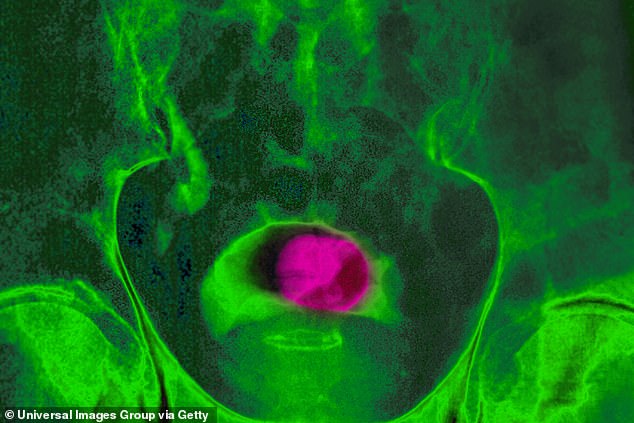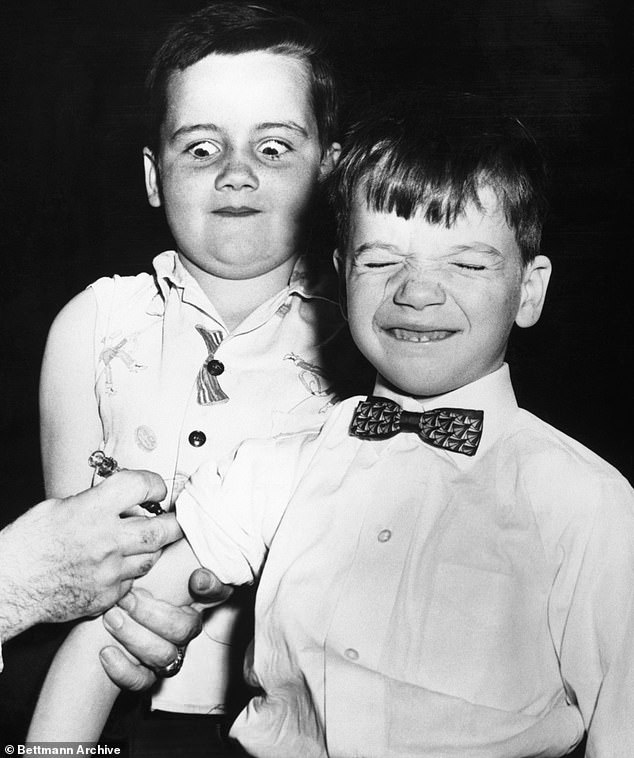Men with prostate cancer could soon be cured in less than two weeks thanks to a new high-speed radiotherapy technique – halving the time of standard treatment.
Researchers from The Royal Marsden NHS Foundation Trust and The Institute of Cancer Research found that the usual amount of radiation to treat prostate cancer – delivered in small doses over about 20 sessions in a month – can be safely given in just five big doses over seven to 14 days.
Dr Alison Tree, the study lead and consultant clinical oncologist at The Royal Marsden, said the new technique had shown ‘very promising results’ with few side effects.
She added: ‘Our aim was to understand whether we could safely increase the dose of targeted radiation per day, allowing us to reduce the number of treatments required.

Researchers from The Royal Marsden NHS Foundation Trust and The Institute of Cancer Research found that the usual amount of radiation to treat prostate cancer – delivered in small doses over about 20 sessions in a month – can be safely given in just five big doses over seven to 14 days. (Above, pelvic scan of a prostate tumour)
‘This is ideal for patients as they spend less time in hospital and begin their recovery sooner. It’s also good for doctors as it can free-up hospital resources and allow more patients to get treatment sooner.
‘We wanted to measure if this could be done without changing the level of side effects we see with standard prostate radiotherapy.
‘Our data shows potentially curative prostate radiotherapy can be given with very few side effects for patients in a matter of days.’
Almost 50,000 men are diagnosed with prostate cancer every year in the UK, making it the most common cancer in males.
One option for patients is surgery to remove the prostate, but it leaves many men with erectile dysfunction and urinary incontinence.
Another treatment is radiotherapy, which involves blasting the prostate with X-ray beams that can destroy tumour cells – but there are trade-offs.

Almost 50,000 men are diagnosed with prostate cancer every year in the UK, making it the most common cancer in males. (File image)
The radiation can affect the bowel and rectum, which sit next to the prostate, damaging the nerves and muscles that control when men go to the toilet. This can cause bowel incontinence.
To reduce the severity of side effects, NHS guidance recommends radiotherapy is spread across at least 20 doses, while many doctors choose to extend this to 32 even smaller doses.
But this could soon be cut to just five trips in as few as seven days if the new technique, called stereotactic body radiotherapy, is adopted. It allows clinicians to target tumours with ‘sub-millimetre’ precision.
What’s the difference… between neoadjuvant and adjuvant therapies?
Both terms refer to the timing of cancer treatments.
Neoadjuvant therapy relates to treatments given before the main effort to obliterate the cancer.
This includes radiotherapy or chemotherapy given before surgery to remove a tumour.
The approach is common for patients with breast, colon or lung cancers to increase the likelihood that difficult-to-reach cancer cells will be destroyed.
Adjuvant therapy refers to any treatment after surgery which aims to kill remaining cancer cells, such as chemotherapy or a course of hormone drugs.
Advertisement
Because it is so accurate, much higher doses of radiation can be administered without the worry that they will also damage the surrounding organs.
Results from a two-year global study to research stereotactic body radiotherapy found 99 per cent of patients who underwent the high-intensity treatment were free of severe side effects, while 90 per cent experienced only minor symptoms, such as issues when urinating.
Nearly 900 patients were recruited for the trial, funded by The Royal Marsden Cancer Charity.
Half were treated with the new technique while the others received standard radiotherapy.
Crucially, the new treatment was shown to be equally effective at destroying cancer cells and reducing the risk of the disease returning – nine in ten patients on both arms of the trial whose cancer was classed as intermediate risk or lower did not require further treatment.
Dr Tree said: ‘I think there’s a good argument for adopting it across the NHS.’
Colin Dance, 74, from Surrey, was diagnosed with prostate cancer in March. Doctors at The Royal Marsden said he would need to undergo radiotherapy and placed him on the stereotactic body radiotherapy trial.
He said: ‘My diagnosis was a shock, and being told you need to have radiotherapy treatment is nerve-racking, especially with all the side effects that could happen.’
He began his course of radiotherapy in June, and visited hospital five times in the space ten days for the treatment.
Colin, a clinical engineer who fits prosthetic limbs, said he had no side effects at all, adding: ‘I feel lucky to have had treatment which was over so quickly.
‘It didn’t disrupt my quality of life, routine or stop me working.
‘In July, I had a scan and was told my cancer had shrunk significantly and I wouldn’t need any more treatment for the time being.’
Health hack: Now cough – you won’t feel a thing!
We’ve all been having a few more jabs lately, and they never get any easier.
But researchers from the University of Greifswald in Germany found that people who simply cough as the needle enters the skin are less likely to find it painful, and instead experience only mild discomfort.
The scientists looked at a range of distraction methods to make injections more bearable, and found that coughing causes a sudden, temporary rise in pressure in the chest and spinal canal which inhibits the activity of nerves that relay pain.

Researchers from the University of Greifswald in Germany found that people who simply cough as the needle enters the skin are less likely to find it painful, and instead experience only mild discomfort
Source link : https://www.dailymail.co.uk/health/article-9957577/Prostate-cancer-sufferers-cured-two-weeks-new-radiotherapy.html











